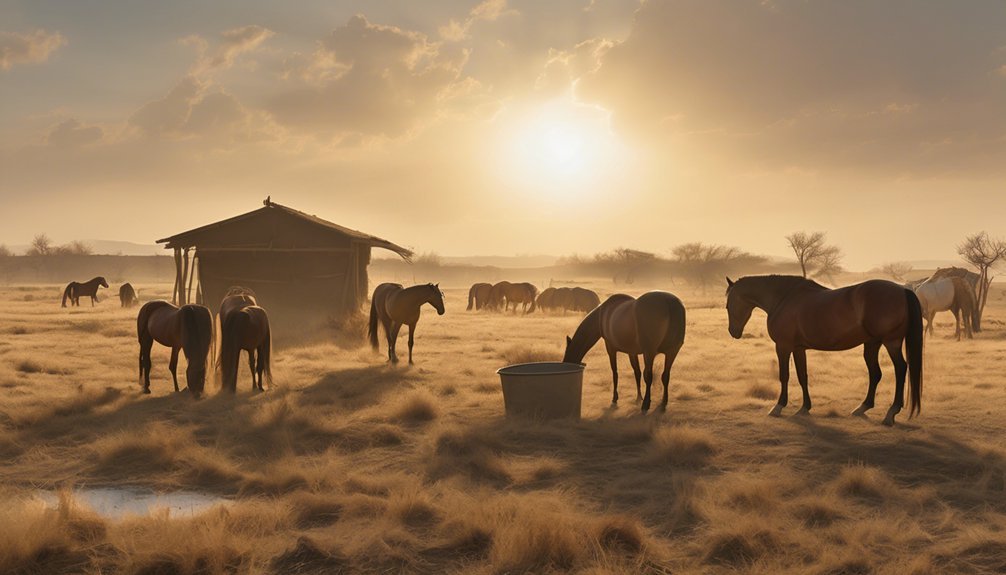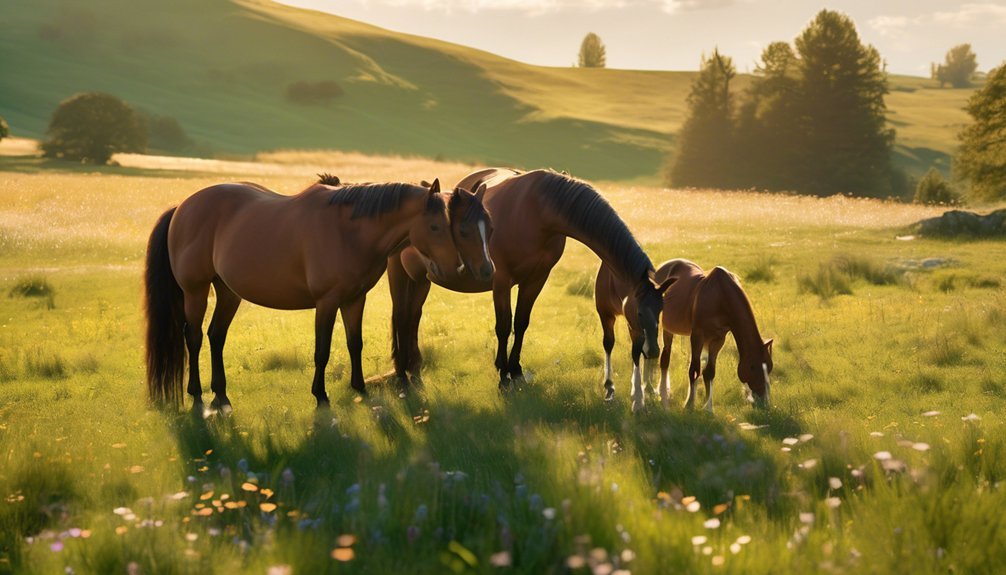
Imagine a racehorse at peak performance, yet struggling to maintain its speed due to inadequate hydration. Water plays a vital role in every aspect of a horse's health, from digestion to energy levels. Understanding how hydration influences these factors can help you optimize your horse's diet and performance. As you explore the signs of dehydration and daily water requirements, you'll uncover strategies to ensure your horse thrives in any condition.
Key Takeaways
- Water is essential for a horse's health, aiding in digestion, nutrient absorption, and overall well-being.
- Horses require 5 to 10 gallons of water daily, with needs varying based on activity level and environmental conditions.
- Proper hydration supports energy metabolism, preventing fatigue and ensuring optimal performance during exercise.
- Fresh, palatable water encourages increased intake, while regular cleaning of water sources prevents contamination and promotes hydration.
- Recognizing signs of dehydration, such as dry mucous membranes and lethargy, is crucial for timely intervention and care.
The Importance of Water for Horses
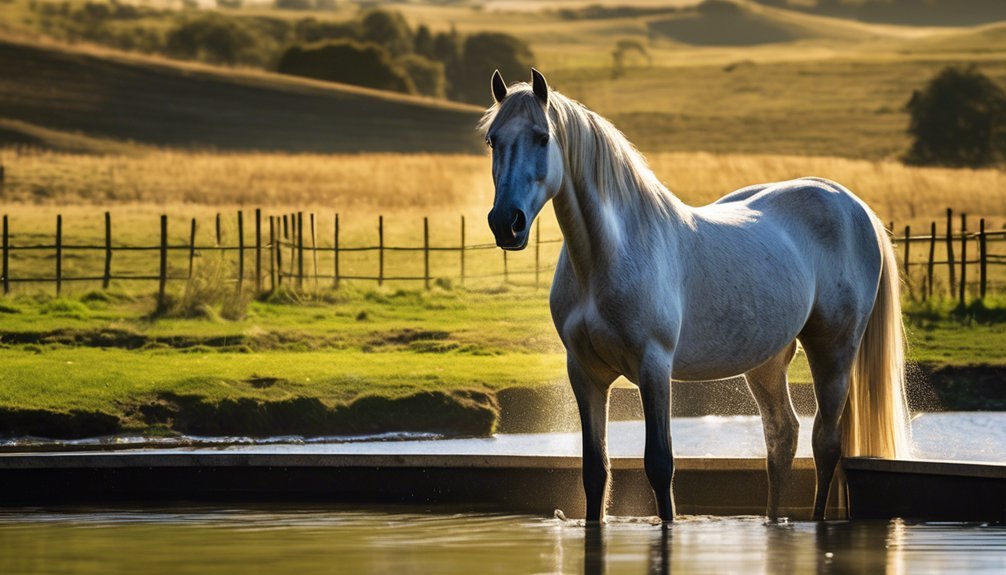
Water is essential for horses, as it plays a critical role in their overall health and performance. Ensuring your horse has access to clean water sources is vital.
Many people hold hydration myths, believing that horses can get enough moisture from feed alone. While feed does contribute, water is crucial for proper hydration, especially during hot weather or strenuous activity.
Dehydration can lead to severe health issues, including colic. You should monitor your horse's water intake closely, as they may not drink enough if the water isn't fresh or palatable.
Regularly checking and cleaning water buckets or troughs can make a significant difference. By understanding the importance of hydration, you'll be better equipped to care for your horse's needs.
How Water Affects Digestion
When you consider your horse's digestive health, it's important to recognize that adequate hydration plays a pivotal role in the process.
Water significantly impacts digestion efficiency, ensuring that food moves smoothly through the gastrointestinal tract. When your horse's hydration balance is optimal, the digestive system can efficiently break down and absorb nutrients.
Insufficient water can lead to dry feed particles, making it difficult for the body to process food effectively, which may result in colic or other digestive issues.
Maintaining proper hydration not only supports digestion but also aids in the absorption of essential nutrients.
Water's Role in Energy Levels
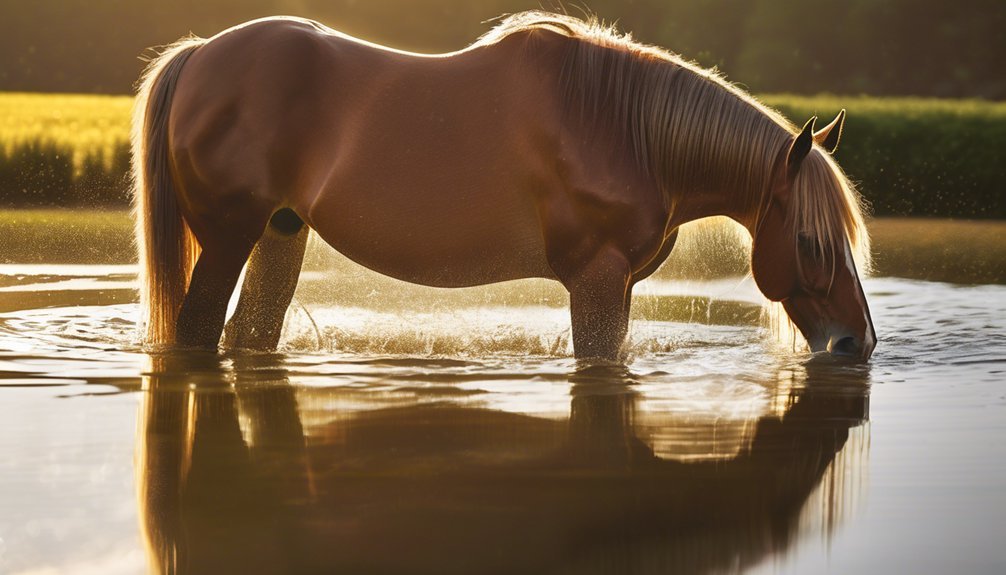
While many factors contribute to a horse's energy levels, proper hydration is crucial in maintaining optimal performance and stamina.
Water plays a vital role in energy metabolism, enabling your horse to convert nutrients into usable energy effectively. When hydration balance is disrupted, energy production suffers, leading to fatigue and decreased performance.
Adequate water intake helps regulate temperature and supports vital bodily functions that are essential for stamina during exercise.
Remember, just as you wouldn't ignore your own hydration needs, your horse requires consistent access to fresh water to maintain that critical energy balance.
Signs of Dehydration in Horses
Maintaining proper hydration is vital for your horse's overall health, but recognizing the signs of dehydration can be just as important. Common dehydration symptoms include dry mucous membranes, sunken eyes, and a decreased skin elasticity.
Conducting a hydration assessment is essential; you can perform a skin pinch test by gently pulling the skin on your horse's neck. If it doesn't snap back quickly, your horse might be dehydrated.
Additionally, monitor your horse's drinking habits and observe any changes in behavior, such as lethargy or reduced appetite. Staying vigilant about these signs will help you take timely action, ensuring your horse remains healthy and hydrated.
Daily Water Requirements for Horses
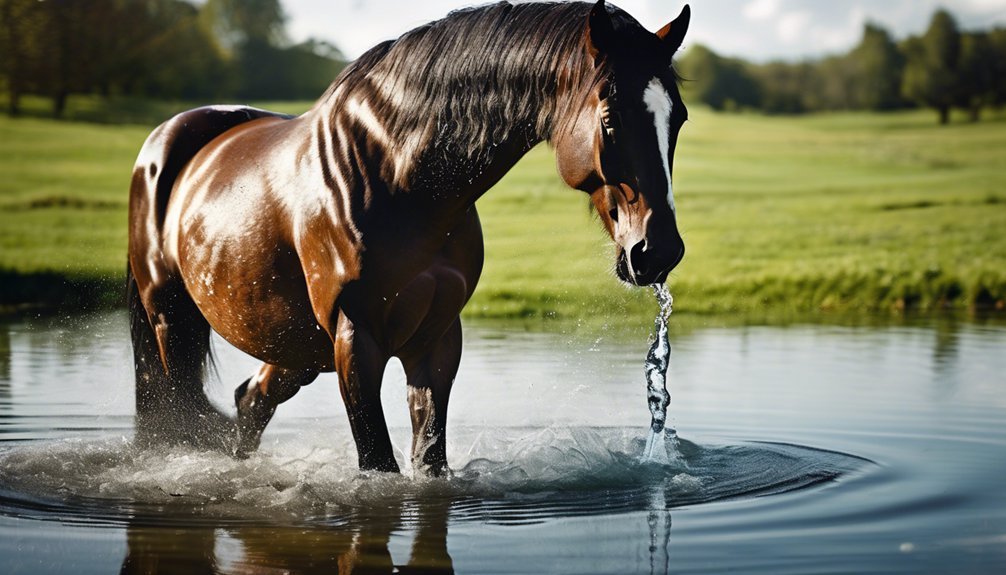
Horses typically require 5 to 10 gallons of water each day, depending on factors like their size, workload, and environmental conditions.
To maintain optimal hydration balance, you should monitor your horse's water intake diligently. A horse at rest may need less water, while one in heavy training or hot weather may require significantly more.
Dehydration can impair performance and overall health, so it's essential to ensure your horse has consistent access to fresh, clean water.
Factors Influencing Water Intake
Several factors influence a horse's water intake, and understanding these can help you ensure your horse remains properly hydrated. Environmental factors, such as temperature and humidity, play a significant role. On hot days, your horse may need more water than usual.
Additionally, the type of water sources available can affect intake; fresh, clean water is more appealing than stagnant or contaminated sources.
- Diet composition: Horses eating dry feed will require more water.
- Workload: Increased activity levels can elevate your horse's hydration needs.
- Health status: Illness or specific medical conditions can alter water consumption patterns.
Being aware of these factors allows you to monitor your horse's hydration effectively.
Tips for Encouraging Water Consumption
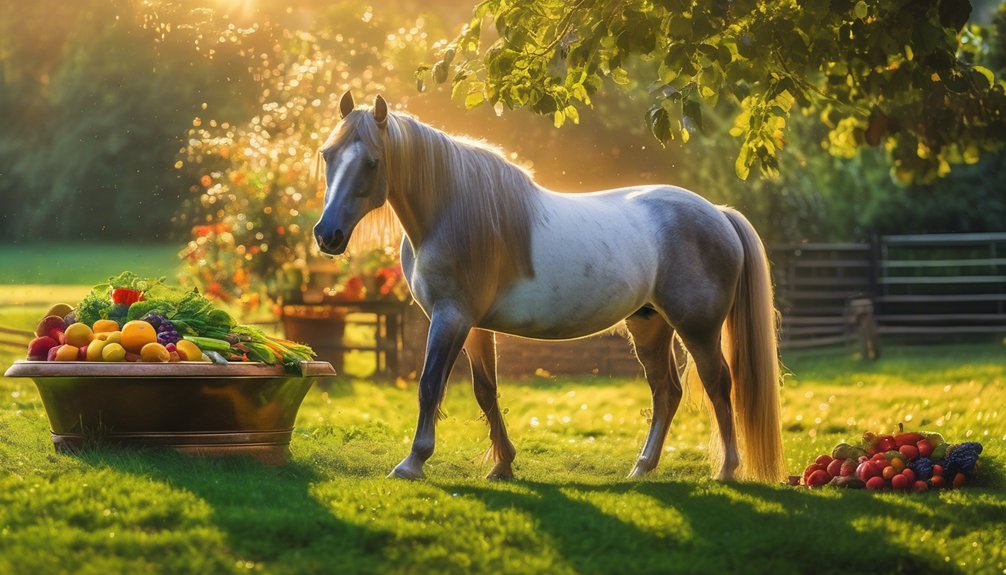
To ensure your horse stays hydrated, consider implementing a few effective strategies that encourage water consumption.
Start by regularly checking and cleaning water troughs to keep them appealing and free from debris. Horses are more likely to drink from fresh, clean sources.
Next, think about using flavor enhancements; adding a splash of apple or peppermint flavoring can entice your horse to drink more. Experiment with different flavors to find what your horse enjoys most.
You can also try providing multiple water sources around the pasture, making it convenient for your horse to hydrate while grazing.
Lastly, monitor your horse's water intake daily; noticing changes can help you adjust your strategies effectively. Keeping your horse hydrated is essential for their overall health and well-being.
The Impact of Temperature on Hydration
When temperatures rise, your horse's hydration needs significantly increase. The temperature effects on hydration can be dramatic, especially during the summer months.
As the heat intensifies, your horse may sweat more, losing vital fluids and electrolytes. It's crucial to monitor their water intake closely during this time to ensure they remain healthy and hydrated.
Consider these key factors for seasonal hydration:
- Increased sweating leads to higher fluid loss.
- Hot weather can decrease a horse's thirst drive.
- Access to cool, fresh water encourages drinking.
Hydration Strategies for Active Horses
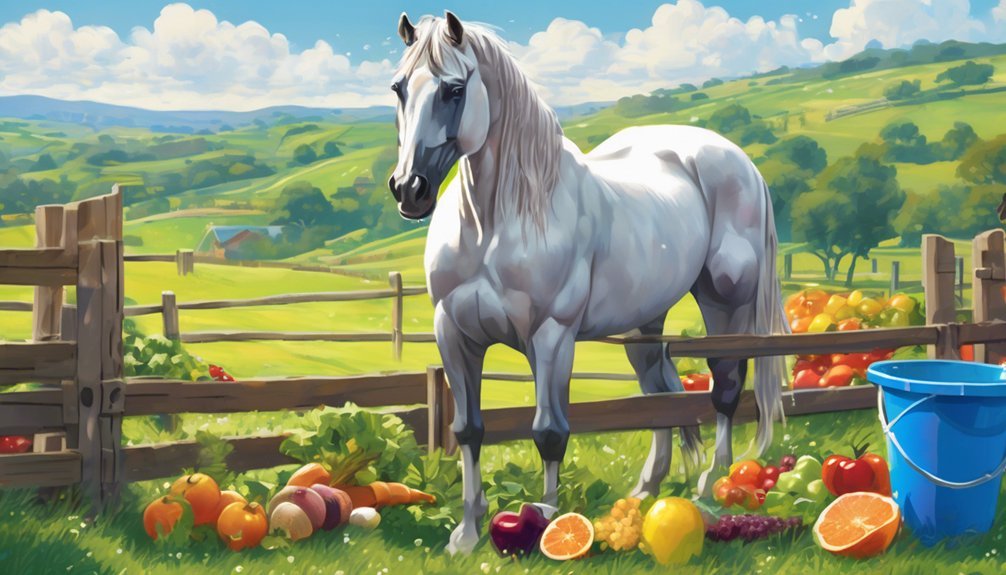
How can you ensure your active horse stays properly hydrated during rigorous activities?
First, incorporate regular hydration monitoring by checking your horse's water intake before, during, and after exercise. Offer water frequently, especially after intense work, to encourage drinking.
You might also consider electrolyte supplements to maintain their electrolyte balance, particularly after sweating. These help replenish lost salts and enhance thirst.
Additionally, providing access to fresh, clean water is crucial; horses often drink more when water is palatable.
Pay attention to your horse's behavior—if they seem lethargic or exhibit dry mucous membranes, it's a sign they may need more fluids.
Maintaining Water Quality for Optimal Health
While hydration is vital for your horse's health, the quality of the water they consume is equally important.
Ensuring that your horse drinks clean water from reliable water sources will promote optimal health. Contaminated or poor-quality water can lead to serious health issues.
To maintain water quality, consider these key factors:
- Regularly clean water troughs to remove algae and debris.
- Implement water filtration systems to eliminate harmful bacteria and pollutants.
- Test water quality periodically for contaminants and pH levels.
Frequently Asked Questions
Can Horses Drink Too Much Water at Once?
Yes, horses can drink too much water at once. While they have hydration limits, excessive water consumption may lead to discomfort or colic. Monitor their intake to ensure they stay healthy and comfortable.
How Does Water Intake Affect a Horse's Coat Condition?
Water intake directly influences your horse's coat health. When you maintain proper hydration balance, your horse's skin stays supple, promoting a shiny coat. Insufficient water can lead to dryness and dullness, impacting overall appearance.
Is It Safe to Give Horses Flavored Water?
While flavored water might entice your horse, it's crucial to consider their preferences and potential additives. Some flavors can be safe, but always prioritize their health over novelty to ensure proper hydration and well-being.
What Role Does Water Play in a Horse's Metabolism?
Water's crucial for your horse's metabolism, facilitating water absorption and supporting metabolic processes. It aids in nutrient transport, temperature regulation, and waste elimination, ensuring your horse maintains optimal health and performance throughout its daily activities.
Can Horses Hydrate Through Foods Instead of Water?
Absolutely, horses can hydrate through foods like watermelon, which boasts high moisture content. While not a substitute for water, hydrating foods supplement their intake, especially in warmer weather, ensuring they stay well-hydrated and healthy.
Conclusion
In conclusion, understanding the pivotal role water plays in your horse's diet goes beyond mere hydration; it's a matter of health and performance. The theory that hydration directly influences energy levels and digestion is backed by clear evidence. By ensuring your horse has consistent access to clean, fresh water, you not only support their immediate needs but also safeguard their long-term health. Remember, a well-hydrated horse is a more resilient and capable partner in any endeavor.



